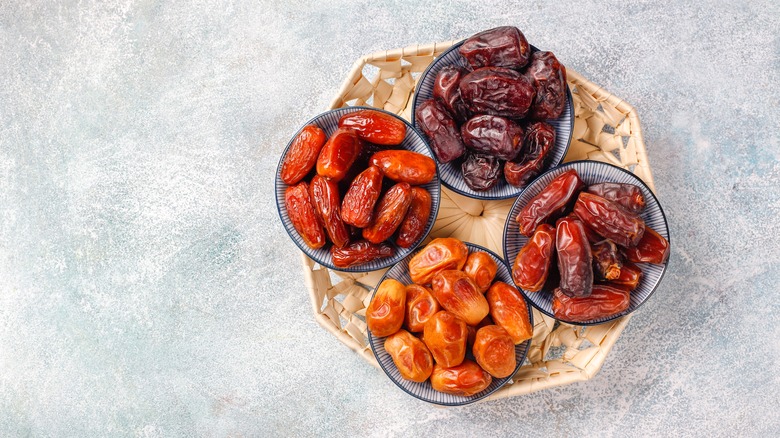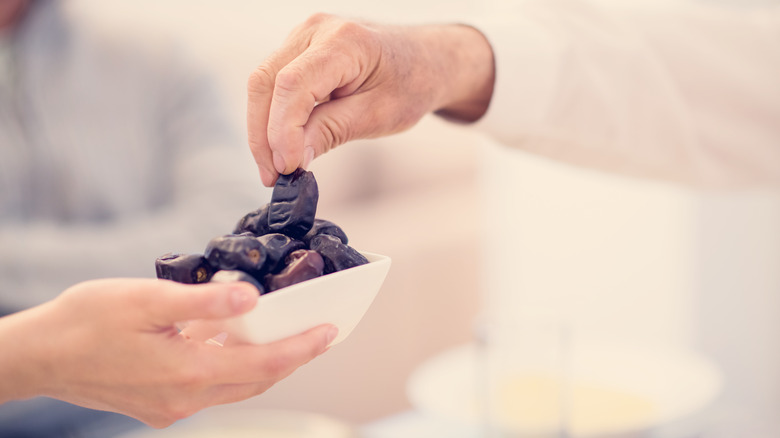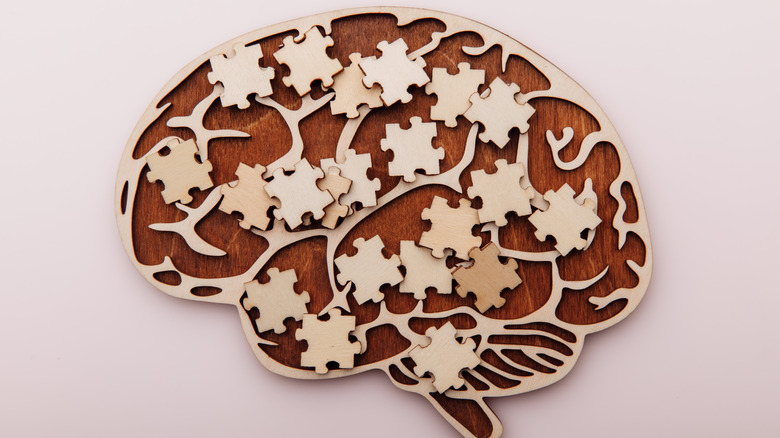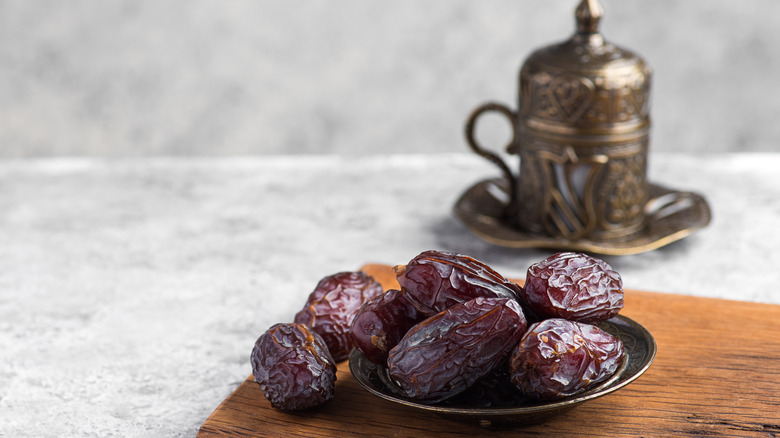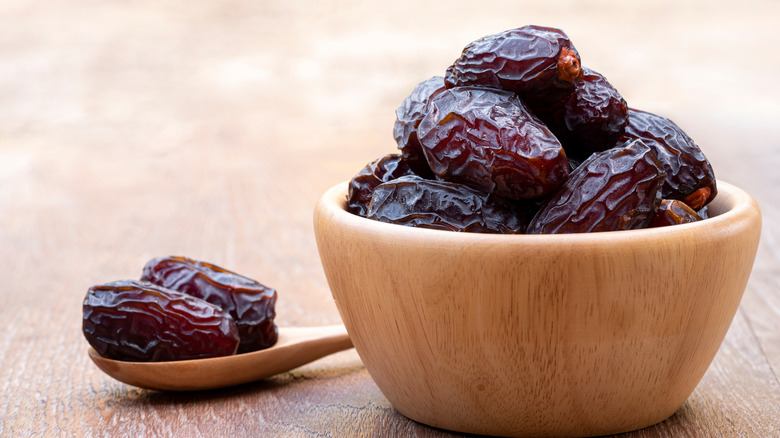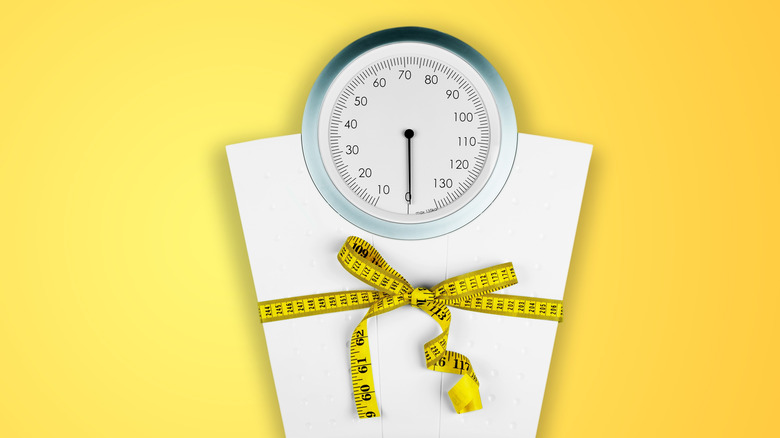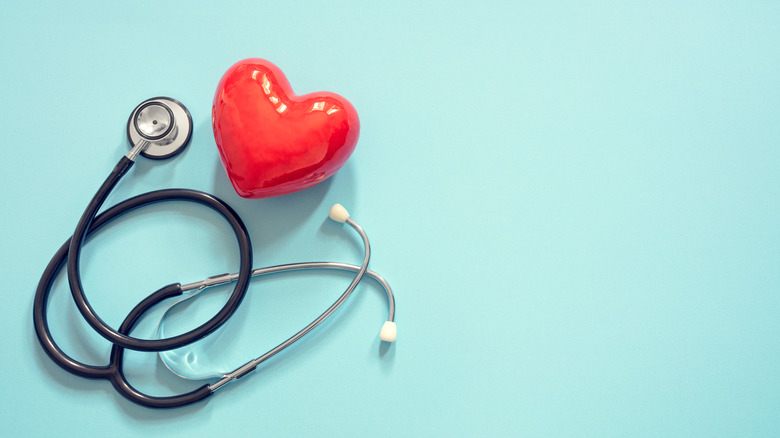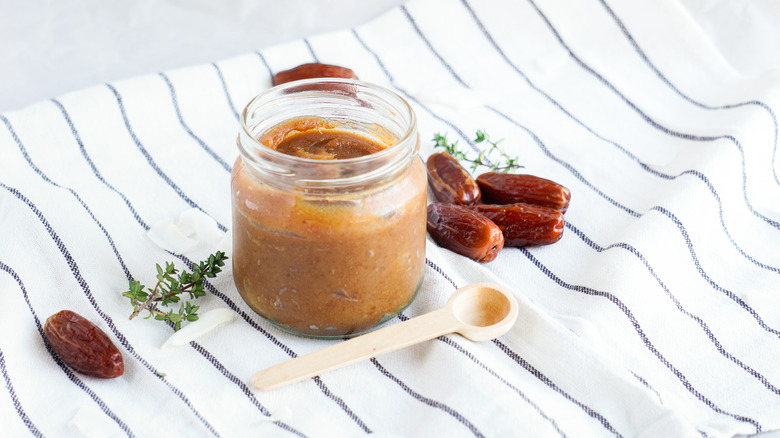When You Eat Dates Every Day, This Is What Happens To Your Body
Now, we don't know about you, folks, but we're big fans of dates — and we're not talking about the ones you find on Tinder. These dried fruits have been a mainstay of diets worldwide for thousands of years, but only began reaching U.S. dinner tables at the turn of the 20th century (per National Geographic). Nowadays, though, dates are pretty much everywhere you look, and demand for the super-sweet, syrupy bites has skyrocketed: Americans consumed over 32,000 metric tons of dates in 2020, according to Statista.
And we can see why. Dates are not only absolutely freakin' delicious, but they're a versatile fruit that can be enjoyed both on their own as a snack, or in a range of other dishes — in smoothies, as a topping on salads, wrapped in bacon and served as an appetizer, or even as a sweet addition to your oatmeal (via The Kitchn). But given the naturally sweet flavor of dates, you might wonder whether something that tasty is good for you if you eat it daily. So, we decided to find out. Let's take a look at what happens to your body if you eat dates every day.
They may help you ease constipation
If you're experiencing a little trouble passing stools, you're not alone. Roughly 4 million people in the U.S. have constipation regularly, and it's hardly a pleasant feeling (per Johns Hopkins Medicine). But sometimes, a few simple changes in diet can help to shift constipation and help you have more regular bowel movements, and that's where dates come in.
It's all thanks to the impressive fiber content in dates (as well as other dried fruits), which can assist stools in moving through your system with greater ease, says Everyday Health. For every two dates, you'll get roughly 3 grams of fiber (per WebMD). As this fiber passes through your gut, it holds on to water. This water then gets into your stool, making it softer and less impacted. All of this means that you'll have a far easier ride on the toilet. The naturally occurring sorbitol in dates may also ease your stool's passage through your body, as Healthline discusses.
Eating dates every day will give our body a boost of antioxidants
Making sure our food is nutritious as it can be is key to a good diet, and ensuring that we're getting enough antioxidant-rich foodstuffs is vital. Small molecules of goodness, antioxidants serve to nullify the effects of unstable free radicals on our bodies, which can cause harmful consequences and contribute to a range of chronic conditions (per Healthline). Antioxidants can be delivered to the body via compounds called polyphenols, which occur in plant-based foods and deliver a range of benefits, WebMD says.
And if you're searching for your next antioxidant fix, you need go no further than dates. In research published in The Journal of the American College of Nutrition, it was found that dates have the highest polyphenol concentration among dried fruits, with figs also having notably high antioxidant levels. However, it should be pointed out that when the dates (and the other dried fruits tested in the study) were processed, their polyphenol levels dropped significantly — so make sure you're getting a natural product when possible for a supreme antioxidant kick.
You'll get a boost of vitamins and minerals
Without vitamins and minerals, we'd be in a sorry state. Simply put, vitamins and minerals allow our bodies to do everything they need to do to keep us healthy, from helping us grow to making sure our immune systems work well, to allowing our cells to function properly (per Nemours TeensHealth). Consuming food that has ample vitamin and mineral content is, therefore, vital — and dates can help on many fronts.
Among the vitamins and minerals you'll be getting a solid dose of when you snack on dates are vitamin B6, iron, potassium, manganese, magnesium, and copper (per Healthline). Copper is particularly important for the body, as not only does it keep your nerves and red blood cells functioning properly, but it also assists in converting sugar into usable energy, says WebMD. Manganese, meanwhile, supports your body in absorbing calcium, forming connective tissue, and ensuring correct hormone function (via Mount Sinai). All that from a few tasty morsels of dried fruit — who knew?!
Your bones may get stronger if you eat dates every day
We all want our bones to remain healthy, and yet we rarely think about them unless there's a significant concern. But your diet's contribution to your bone health is paramount to help prevent bone-related conditions down the line, and dates should be taking front-and-center for their helpfulness for our bones.
Dates are a mineral powerhouse, absolutely packed full of calcium, magnesium, phosphorus, and potassium, says registered nutritionist Nicola Shubrook via BBC Good Food. All of these minerals play a part in bolstering our bone health, with calcium, of course, being imperative to making (and keeping) our bones and teeth strong, according to the Harvard T.H. Chan School of Public Health. On the vitamin side, dates are also a great source of vitamin K, which plays a part in bone health through both regulating bone metabolism and ensuring that our bodies absorb calcium properly and keep our calcium levels high, says research published in Nutrition.
Eating dates every day may help promote brain health
When you eat dates every day, you're not just doing your taste buds a favor — you're doing your brain a favor too. It's been shown in research published in Neural Regeneration Research that dates may be particularly useful in the prevention and treatment of certain neurodegenerative diseases.
Researchers examined the link between date consumption and potential benefits for a range of neurological conditions including Parkinson's disease, Huntingdon's disease, and Alzheimer's. It was found that for Alzheimer's in particular, eating dates seemed to work against the brain inflammation and oxidative stress that can make the condition more serious. This may well be down to the impressive polyphenol content of dates, the antioxidant effect of which can combat free radical damage. Researchers concluded that while dates exhibit promising potential for the treatment of age-related neurodegenerative conditions, more study is needed to determine exactly how they help.
Dates may help boost your hair health
Flowing, lustrous locks are the envy of everybody, and the sight of a perfect mane of hair has sent more than a few of us scurrying to the conditioner aisle. But hold your horses, folks: You don't need to spend hundreds of dollars a year on high-grade hair products when snacking on dates is all you need! (Okay, maybe not all you need, but they can help.)
"Being rich in iron, dates improve blood circulation to the scalp, which helps in faster hair growth," explains Skin Alive's director and consultant dermatologist Chiranjiv Chhabra to Vogue India. The iron helps to move blood around your body, Chhabra says, which keeps your hair growing at a healthy pace and reduces hair loss. Dates can also assist in keeping your mane looking dynamite by providing strength to your follicles and roots, which again prevents your hair from falling out and makes them stronger, stopping them from breaking. The best part is, that you don't need to eat a load of dates to get the benefit for your hair: Chhabra says that eating just a few per day may have a positive effect.
Eating dates may reduce your risk of certain cancers
Our diets can be a factor in the risk of developing certain cancers. So it might be music to your ears to hear that snacking on dates may bring down the chance of developing specific cancers, most notably colorectal cancer. Research published in the British Journal of Nutrition found that eating dates regularly seemed to have a link to the reduction of colorectal cancer development, without any significant change to the gut microbiome. Dates were seen to promote healthier bowel movements and increased frequency, as well as bringing down the concentration of ammonia in fecal matter.
So, how exactly do they do this? It all comes down to their combination of fiber and polyphenols. The researchers suggested that the interaction between these two components of the dates and the gut microbiota helped to generate better stool and colorectal health. Add to that the generally beneficial effects of dates against cancer thanks to their antioxidant content fighting against free radicals (per the Fox Chase Cancer Center), and this is one snack that you should definitely be eating every day.
If you have kidney disease, you may want to avoid eating dates
While dates may be both nutritious and delicious, for some folks, they're better avoided. The impressive nutritional profile of dates includes an ample amount of potassium — four dates can provide almost 700 mg of the mineral, according to Healthline. This heavy concentration largely comes from the fact that dates are dried, which intensifies the nutritional load.
This makes dates particularly unsuitable for folks who have kidney disease. Consuming too much potassium becomes an issue when you have kidney disease, as your organs are no longer able to process it in the same way, says DaVita. This then leads to a buildup in the body, and potentially further damage. Some of the warning signs of this buildup include a slow pulse, nausea, and feeling weak or fatigued. It's also worth knowing that dates are not the only dried fruit culprit in the high-potassium stakes: Similar dried fruits, like prunes and raisins, also deliver a potent hit of the mineral, and should be avoided for those on a low-potassium diet.
Daily dates may help control your blood sugar
With a mouthful of succulent sweetness with every bite, you might assume that dates are bad news for your blood sugar. But if you love dates and are watching your blood glucose levels, you may be in luck. While the sugar levels of dates are indeed high, they are also rich in fiber (via Healthline) — and this fiber may serve to limit spikes in blood sugar, as research published in Nutrients shows.
Indeed, this fiber level means the glycemic index (or GI index) of different varieties of dates is pretty low, according to research published in Nutrition Journal. The GI index is a measurement of how much a given food is likely to raise your blood sugar, according to Harvard Health Publishing. And this research, which looked at the effects of eating dates on the blood sugar levels of people who have diabetes, found that consuming the fruit didn't result in any significant escalation in blood glucose, meaning these fruits have a lower GI index. It's important to note, however, that the number of dates that the participants in the Nutrition Journal study were eating was small — if you're eating handfuls at a time, they still have the potential to increase blood sugar further.
Eating dates every day will boost your caloric intake
Okay, so we realize that this one sounds a little silly: After all, eating anything will boost your caloric intake. But how much energy you're consuming when you snack on dates every day is still worth considering, as dates do pack a fairly high caloric punch for their serving size. A portion of four dates, equating to roughly 100 grams, will come in at approximately 277 calories, according to Medical News Today. The vast majority of their calories come from plant sugar, with 100 grams of dates delivering around 75 grams of carbohydrates, as well as a good amount of fiber, a small amount of protein, and virtually zero fat.
Now, this isn't to say that dates are incompatible with a healthy lifestyle — they are super-nutritious, after all — or that they can't be incorporated into diets that individuals might be following to reduce calories. Indeed, research published in Nutrients found that eating three dates every day didn't lead to any notable weight gain amongst participants. However, as with any food, eating dates in higher amounts can take your daily caloric intake up, and Medical News Today recommends trying to keep your date serving size to just a couple each day.
If you're pregnant, eating dates daily may ease labor
Now, this one really blew our minds. If you're pregnant, you might find it preferable to choose a diet that can make your experience as smooth as possible — and incredibly, eating dates daily may make your labor both shorter and easier. A study published in the Iranian Journal of Nursing and Midwifery Research looked at the differences in labor between those who ate dates every day from the 37th week of pregnancy, and those who didn't. It was found that participants who ate around 75 grams of dates every day from this point not only went through shorter labor overall, but they also generally needed less pain relief during the experience.
An earlier study, published in the Journal of Obstetrics and Gynaecology, had similar findings. This research focused on participants who ate six dates per day starting around four weeks before their due date. Again, it was found that those who did this had easier delivery experiences, and additionally, that it was less necessary to induce labor.
Eating dates may help your mood improve
It's pretty easy to see how eating dates could improve your mood: After all, who wouldn't feel happier after a few delectable bites? But as it turns out, dates don't just make you feel better because they taste good. They also have a few key components which may cause an overall lift in mood. The first is the tryptophan present in dates, as the BBC discusses. Consuming tryptophan helps our brains then create melatonin and serotonin, hormones that not only make us feel happier and more peaceful, but also serve to regulate our sleep-wake cycle, making sure that we get the zzzs we need (per MedlinePlus).
Additionally, dates are a premium vehicle for vitamin B6. Keeping on top of our B6 levels is important for a multitude of reasons, not least because having insufficient amounts in our bodies can contribute to increased incidences of depression, as research published in Nutrients discusses. A deficiency of B6 may also lead to increased irritability (so you can blame it on that instead of your hard day at work, next time, folks — that one's on us!), feeling less alert, and a higher chance of cognitive decline and developing dementia.
Eating dates regularly may help to reduce the risk of heart disease
We know that everyone knows how important the heart is, but honestly, can we just hear it one more time for our tickers? The fact that they pump blood around our bodies all day, every day, for our whole lives, is pretty incredible. That's why we're firm fans of foods that can help support heart health. Luckily, dates can do just that.
Research published in the Journal of Agricultural and Food Chemistry looked at the impact of eating 100 grams of dates a day for four weeks on a range of heart health factors. The researchers found that eating both Medjool and Hallawi dates resulted in lower serum triglyceride levels. Our triglyceride levels are a huge factor in our overall heart condition, and having triglyceride levels that are too high can significantly increase our risk of developing heart disease, as the Mayo Clinic states. The research also indicates that eating Hallawi dates specifically may result in lower levels of oxidative stress, again an important factor in heart health, says research published in the Journal of the American College of Cardiology.
Is it healthy to frequently substitute dates for sugar?
With all of the talk around the nutritional goodness and natural sweetness of dates, it's probably not surprising the fruits are frequently used in recipes instead of sugar in an attempt to make a healthier choice while reaping the benefits of their syrupy taste.
And at a glance, it does seem to make sense to sub dates in where sugar would normally go. Dates contain a higher amount of fiber and have a lower GI index than sugar, as Healthline states, making them a potentially healthier choice for folks trying to control their blood sugar. However, it's useful to point out that the type of sugar in dates is fructose, and while this sugar is naturally occurring, consuming too much of it can lead to a host of health concerns, notably metabolic syndrome (per Healthline). So, while it might be preferable to sub in dates for sugar where appropriate, it's also important to watch your sugar intake generally.



